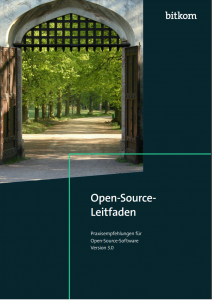For 6 years, the Bitkom Open Source Guide 2.0 was a tutorial for the appropriate use of open-source software. It was a benchmark for German companies. But it has aged over time, naturally. Good that Bitkom and its ‘Open Source’ working group have taken up the topic again: In June 2022, there was officially released an expanded and refined Bitkom Open Source Guide 3.0, — again intended to be a manual and a benchmark for companies
The one amazing thing is that with this guide, Bitkom has published a ‘handout’ under a (kind of) open-source license for the first time, that is to say: under a Creative Commons license (CC BY-ND 3.0 DE). Apparently, the idea of a freely accessible service is also coming to the fore at Bitkom. That gives his voice even more weight. But it is understandable that Bitkom does not allow third parties to modify the work (ND = Non Derivation). It wants to preserve the gained quality and reliability. However, by using this CC license Bitkom permits any other type of use by third parties, including commercial use. And in the not-too-distant future, Bitkom will certainly bring itself to make the sources generally accessible, not just in a ‘closed’ GitHub organization.
The second astonishing thing is related to this. Bitkom has allowed its authors to organize themselves via and with GitHub. Anyone could take part. Anyone could become a member of the organization and thus access the GitHub repository containing the (partial) results. Bitkom has — again, for the first time and successfully — developed a book using the methods of open-source software development. The authors wrote the chapters of the Bitkom open-source guide in Markdown. Then they checked their modifications into the repository as snippets. Eventually, they combined them as a complete work via incidents and pull requests, although by no means all authors were familiar with GitHub from the beginning. This fact also points beyond itself: Git, GitHub or GitLab can significantly simplify (cross-company) cooperation and collaboration.
And the third amazing thing is the transformation of the content. While the release 2.0 still focused on the legal aspects of use, the new Bitkom Open Source Guide 3.0 is much more comprehensive and balanced: It discusses both, the benefits of FOSS and its development process. It analyzes the integration into business models and corporate strategies, explains open source compliance, and considers the FOSS history — each on almost the same number of pages. The other aspects of FOSS are no longer an appendage of compliance. The BOSL‑3.0 takes the prerequisites for the successful use of open-source software into account generally, without reducing the topic of ‘license compliance’. And each section, with only 10–20 pages, can easily be used to get a quick overview.
What does this mean for companies? Well, for the moment, BOSL‑3.0 is still a German guideline. But with it, the companies get another reliable guideline that external experts have reviewed several times.
And in what way is this …
… part of the overarching topic FOSS Compliance? For fulfilling the requirements of FOSS licenses, we have to consider specific individual cases as well as side effects — for software, pictures, or documents. We should unhide trends and write guidelines. Above all, however, we must drive forward the automation of license fulfillment, make our licensing knowledge freely available, cast it into smaller tools, and bring it into larger systems: Because FOSS thrives on freedom through license fulfillment, large and small. That’s what also this article is about.
